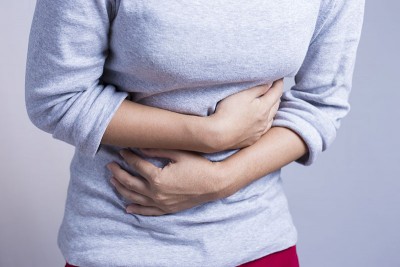
Bloating is one of the most frequently experienced symptoms of menopause. It can affect any menopausal woman, but is more likely in those who experienced bloating when suffering from premenstrual syndrome (PMS) or in those that are overweight.
Bloating is often caused by a change in oestrogen levels, and can be hugely uncomfortable causing tightness in the abdominal area. It can last from a few hours to several days, and during this time it’s not uncommon to experience increased levels of wind or flatulence.
Experienced during early perimenopause, some women may initially have high levels of oestradiol in response to higher FSH (Follicle Stimulating Hormone) levels. High oestradiol levels can cause not just bloating, but breast tenderness and swelling also. The higher levels of oestrogen has an effect on the retention of water that naturally occurs as part of your menstrual cycle and a sudden surge in levels can cause bloating. In addition, the amount of bile your body produces changes, affecting the way your digestive system and the amount of wind or flatulence being produced in the digestive system.
Bloating can also be a side effect of HRT.
What to do if you experience bloating
If bloating persists for more than a few weeks, you should speak to your doctor to eliminate any underlying health issues. In the meantime, however, you can try to reduce your bloating by:
Drink peppermint tea
Peppermint is excellent for mitigating bloated stomachs and alleviating gas torments. The ingredient menthol has an antispasmodic impact on the smooth muscle of the digestive tract, making it a must for after-meal pain.
Drinking ginger tea
Another tea to battle stomach bloating is ginger tea, which can be made using grated gingerroot, hot water, lemon juice and honey. Ginger is said to have anti-inflammatory and analgesic properties. For best results, let gingerroot steep for 10 minutes before drinking.
Get active
Physical activity helps air pockets pass through your digestive tract faster, reducing bloating quickly. The moment you feel yourself becoming bloated, take a ten-minute walk around the block and see what happens.
What about preventing bloating?
It’s all very well having a few tricks up your sleeve for easing bloating, but wouldn’t it be better to prevent bloating rather than treat it? Of course it would!
Fortunately, there are not just tips for reducing the severity of bloating, there are tips for AVOIDING bloating too. These include:
Changing your eating habits
Your body can bloat more easily depending on your diet and your food intake. Eating large meals for example can overload the digestive system, as can eating quickly. Try reducing your portion size and eating slower. By breaking your food into more manageable chunks, your stomach has less work to do and will produce less gas as a result.
Avoiding certain foods
Certain foods, such as cabbage, onion, broccoli, soft cheese, apples and beans can be difficult to digest and can cause increased gas. Every time you think of eating one of these foods, switch it for a food known to minimise gas, such as bananas, grapes, eggs, yoghurt and hard cheese.
Meditating
Practicing relaxation techniques such as meditation and yoga can increase blood flow to the digestive tract and stimulate the intestinal action of breaking down food. When blood flow is halted by stress, it results in an ineffective digestive system that will ultimately cause bloating and other health problems.
Drinking lots of water
Water can do wonders for your digestive system by flushing out the toxins that may cause discomfort. The trick is to consume it throughout the day and as part of a meal or snack, rather than drinking too much at once, which can cause excess gas and bloating.
Exercising regularly
Exercising for 30 minutes a day can help reduce water build up in the body so long as you breathe properly and keep yourself hydrated. Cardio in particular – think swimming, jogging, cycling and step aerobics – helps gas freely pass through the digestive system.
What to do if you still can’t seem to beat the bloat
If you’ve tried the above tips and you are still experiencing bloating, remember that you are not alone. Anywhere from 30 – 60% of menopausal women report an increase of gas during this time of their life, leading researchers to believe that hormonal functions play an important role in the production of gas.
Remind yourself that bloating is temporary, and that your body will eventually settle. If you’re at all concerned it’s recommended that you speak with your general practitioner, or alternatively you can speak with the team at the Australian Menopause Centre.